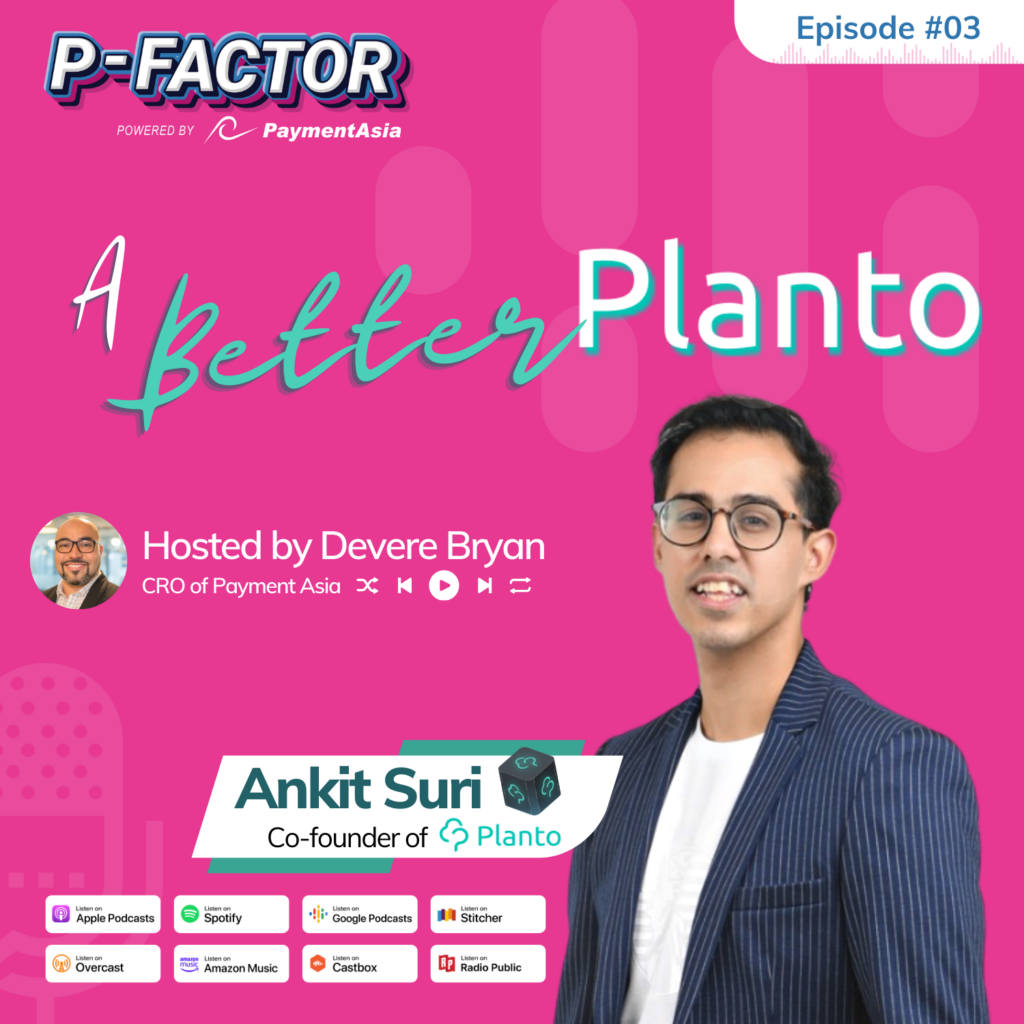Devere: Welcome to P-FACTOR. Today I’m joined by Ankit Suri, he is the CEO and co-founder of Planto. Planto was launched in Hong Kong in 2018, and is a personal financial planning platform and business app for SMEs and consumers around the cities in Hong Kong and Taiwan, right?
Ankit: Yeah. Pleasure, Devere. It is great to be here. And yeah, we are established in Hong Kong and growing in Taiwan.
Devere: Amazing. So let’s get right back to the beginning. What brought you to Hong Kong? Were you born in Hong Kong? Where did you fit into the Hong Kong FinTech world?
Ankit: Yeah, so I actually came to Hong Kong in 2010. To do my university. So it was a good 13 years ago that I got here. I was actually one of the very first students from my school, to actually come to Hong Kong to study. So it was a very new thing. Didn’t really know what I was signing up for. But the only reason I came here was because the university was well-ranked and gave me a little bit of a scholarship. So I didn’t realise the opportunities that the city had before I came. So only when I arrived here, that I realised that the city is incredible, like when I stepped into, you know, when I stepped out and went to the University, met an amazing group of people, and then, you know, went to Central and saw all these people, like, you know, working at all these fantastic organisations, I was just like, this city is vibrant. How did I never hear about this?
Devere: Well, you know, it’s interesting that recently, I was at an event on a panel. And as people were talking, this panel was very Web3-focused. And I was talking about how the US is kind of moving away. And places like Hong Kong, Singapore, and moving towards Web3. And I was like, this is like the new land of the free world. This is like a new place, people can come and live what they would call the American dream. But it’s like the Chinese Dream, the Hong Kong dream you’re living by coming here and choosing this place to do your university education. So very, very good. And so you, you started Planto yourself? Do you have partners? How did it all start?
Ankit: Yeah, so after I graduated, I actually worked in banking, which is what a lot of people do here. But when I was working there I actually met a couple of friends who, who were like minded and wanted to, you know, who had an entrepreneurial mindset wanted to do something. And we felt that, you know, we’re getting incredibly great experience in banking, we were working in a retail bank. So we were like, look, it’s a big part of what people want. Everyone wants, you know, better banking experiences. We were learning a lot. So we were very keen on actually doing something in making, you know, banking better, personal finance better. And then, you know, we made a move, and me and my co-founder today, we actually made a move from that particular bank to a FinTech, just to get some experience working at a FinTech and learning some new things. That’s when I, that’s when we reconnected with one of my juniors at university, on an idea that actually, you know, personal finance can be better. And really, the way it came out was that me and my co-founder … We were just like, talking about working in a bank for three years, and the amount of savings we had was just ridiculous. And so we were like, where is all this money going? Right? And, you know, we look at our bank accounts, and it wouldn’t really tell me what’s, you know, it wouldn’t tell me what happened with my money, it wouldn’t tell me, what should I do next. I mean, I was 25, 26. And really, I should be getting, you know, some nudges from somebody telling me to think about, you know, what five years down the line, my money should look like, or a few years down the line, but there was nothing.
And so we were like, look, this is broken, right. And, and so when we spoke to our friends as well, we felt that everybody had the same set of questions around personal finance, right? Like, you know, where’s my money going? What do I do next? How do I invest? Where do I get started? And this is back in 2015, 2016 when FinTech was still starting to get around. So, you know, we realised that actually, when it comes to financial education, and when it comes to being proactive, we think that, you know, banks or FinTech would go towards that. We thought that they would go towards that. So that’s when we realised that there’s a gap in the market.
There are going to be all these banks in all these fintech, we’re going to specialise in building products. And there needs to be someone who basically bridges the gap between what the customer needs to be told, and what you know, they are producing, what the banks are producing, that’s where we felt that we should start this company called it Planto,
Devere: That’s amazing, you know, and it’s a familiar story. You know, many founders that I’ve spoken to over the years, the reason they created their business, or the initial idea, the genesis of that business idea was because they were frustrated by something that they couldn’t themselves have found at the system that they were working in. Right, so you’re talking about the banking system there. And, you know, having worked in a bank before, a lot of times you’re in your lane, and people stay in their lane, inside a big corporation, a big banking corporation like that, for whatever reason, sometimes just to deal with compliance or risk or just focus, right, whether you’re looking at generating revenue or managing operations, whatever it may be, whatever it does to the people, it stops innovation. And oftentimes, somebody sitting at a desk in a cubicle comes up with the greatest idea that changes the world. So, you know, that’s what I’m looking at, across the table today, somebody that’s doing that.
So Planto right now, you know, cut to 2023, five years in, you have 200,000 customers, now you have a very vibrant community, like teach me around what it does, how you got those customers, and some of the key features that plan to supply to individuals and SMEs around the city.
Ankit: Yeah, absolutely. So, when we started out, in 2018, one of the first products, we had a very clear-cut mission, which was to bring innovation for personal finance management. So the very first product we created was this personal financial management app that will enable customers, people like you and me to manage all our financial relationships in one place. So I go to this app, I’d be shown this onboarding survey, which would ask me why am I here, and then based on that responses, we’ll personalise the whole app customer experience for you, and basically give you this, you know, a list of financial institutions that you want to link, if you’ve got four credit cards in your wallet, you could link all of them up, if you’ve got multiple, you know, investment accounts, you can link them up, if you’ve got your mortgages or loans, you can link all of that up. And what the app will do is it will give you a very clear way to understand, you know, visual around, how much money you have, how is it growing, where you’re spending, and more importantly, it’ll use all of that data around your spend patterns around your the way you’re managing money, to then start to personalise certain insights and recommendations for you. So that was really the pain point we were trying to go after, which was, look, it’s not just about giving you an idea that looks, you know, you might be spending too much on this Friday night, right? It’s more about what are your financial goals. And how can we help you get there, right, using your data? So the app would really start to understand, you know, what your goals are, what you want to do, and leverage your, you know, the way you’re managing your money today, and give you recommendations and insights around what you do.
Devere: That’s so clever because it’s almost like you are setting a goal and just like a fitness goal, you know, so if you want to lose weight, add muscle, whatever it may be, the Planto app will do that from a financial services perspective, saying you want to have X amount of money in your ABC account and an X amount of money in your EFJ account, you know, this is how far away you are from that goal? Or does it give you warnings if you’re not getting close to the goal?
Ankit: Yeah, so actually, one of the biggest things, which got a lot of coverage when we launched was, we identified that in Hong Kong home planning is, you know, it’s one of those scary things, right? Because all the news is about how expensive it is. At the same time, everyone aspires to be a homeowner here, right? So one of the things we built was we’ve built this really cool financial planning tool, which basically leverages users data and you know, to actually help them visualise how they can save towards or invest towards purchasing a home, right. And that whole visual journey was super impactful. Right? We’ve got lots of millennials who actually just tried downloading the app just to try that out.
And once you actually set that home goal, it will track your balances, your investments, and help you understand how you’re progressing towards that right. And what we have done is we have partnered with, you know, because Hong Kong has got this incredible number of, you know, banks as well as fintechs, who are building these different numbers of like, you know, products out there. So we’ve partnered with many of them, I think we’ve got more than 40 partners right now. And what we do is we’ll then link our customer up to those partners, to see whether their products can help them achieve this particular goal that they have.
So we’ve built this whole ecosystem around what your financial plans are, what you want to do with your money, and we’ll help you get there using our ecosystem partners.
Devere: That’s powerful. So you’ve kickstarted it with a guest. Like, there’s a lot of verbiage on the website around digital banks, and whatnot. So you’re working with the new digital banks and the fintechs, working with traditional banks. And I guess you’re just listening to the customers, right? And adding partners, as you see a need.
Ankit: Yeah. So you know, we are trying to understand your leverage going by data as well, right? Customers are trusting us with their spend data with their banking data, and we’re leveraging that to understand, you know, what is the customer looking for, and who can help them out there.
The other part of this is that, you know, we also realised that it’s actually very difficult for a consumer focus, FinTech alone, to actually impact millions of customers out there, right, because you just got this really huge population who need help, right. And, and so, what we have done is that over the years, we’ve evolved ourselves by proving, you know, as a b2c company, that actually this model works, that if an app wants to, you know, leverage users data and understand their financial goals, that we can help them get there using various kinds of products.
What we have done is we’ve leveraged, we have packaged this experience into a product that now banks can start to licence from from Planto directly, and actually offer it to their own customers, to ensure that, you know, they can independently help them, you know, engage these customers and help them you know, improve their financial health as well. So, by doing that, what we have done as a company is that we are not restricting ourselves to these 200,000 customers. But through banks, we are able to scale the impact to many millions more out there.
Devere: That’s amazing. So you use the word trust in that, and you’ve built up because you’re what I would describe as an agnostic, like ecosystem connector, right? You’ve built up trust in your platform to be I know, you’re not offering financial advice, per se, but they can go to that their Planto app and look at multiple different things, right, they can look at payments, they can look at banking statements, they can look at whatever you’ve plugged in, through your partnerships.
So now, after building that trust app, and understanding what the customer needs, you’ve been able to take that as a corporate package, and then go and what it effectively white labelled as part of a banking value-added solution. That’s epic, that’s such an amazing journey. Right? So you’re seamless, you’re on one hand, you’re a product that’s a brand that somebody can go and say, Okay, I’m gonna go and utilise Planto, you’re a SaaS business, right? So you’re going in, and it’s going to pay, what’s the average Planto monthly subscription?
Ankit: Yeah, so we’ve got a premium package, actually. So on the free side, customers can come into the Planto ecosystem, they get financial content for free. So over 500,000 users in Hong Kong actually read the financial content that Planto provides via their newsletters by visiting our website through the app directly. For those 500,000 users, some of them might want to actually use certain tools to, you know, manage their finances. So these users can then use our app and upgrade their membership to a paid membership, and they’d be paying around a cup of coffee for about 40 Hong Kong dollars per month. You can sign up for an annual plan as well, which would be slightly cheaper. And you will have access to, you know, all the tools that we have built and make the whole experience a lot more personalised for you.
And I think one of the things I need to say here is that personal finance is one of those kinds of things, which also tends to be, you know, very localised as well, because different people manage, you know, different cultures tend to manage their finances differently. The banking relationships look very different, the kind of products they use look very different. So one of the reasons why we’ve been able to, you know, really earn that trust that you mentioned, as well from the users, is because we have been able to, you know, integrate more than 80 financial relationships that people have in the city, right. And so we are giving users that holistic overview of their finances, which is really difficult for anyone else to offer as well.
Devere: Having it all in one spot is what people want as well, right? The rise of super apps and whatnot, the success there has been, I want to open one thing not have to open 10 things, if I can open one thing that shows me five different, you know, important things for me, that’s what I want. So you’re creating convenience. But you’re also creating insights, as you mentioned earlier on for their life. And I think what you’ve also created, which is super valuable, is a community. Like, if you’ve got 500,000 people, you’ve created a voice for them to talk to each other, advise each other, suggest solutions to each other. And for you guys to learn from to move on to add, you know, the 81st 82nd, and 83rd financial industry solution into your own ecosystem, which is super smart, really powerful. Alright, let’s take a step back to the embedded piece. So it sounds like you would go to a digital bank or a traditional bank, how does it work when it comes down to the kind of white-labelled piece?
Ankit: Yeah, so during COVID, what we realised was that, you know, banks, whether digital, purely digital or traditional, had to rely on digital channels as a way to engage and serve their customers, right? So a lot of focus then shifted towards, you know, making sure that their digital banking apps were, you know, not just about paying money, or, you know, you know, viewing your balances, but it had to be the place where they could serve customers, provide insights to customers, engage customers, and really make sure that the customer is loyal to them. Because if moving money becomes so simple, opening bank accounts digitally becomes so simple, how do you retain a customer, right, so both digital banks and traditional banks realise that, you know, they need to go beyond just providing the basic banking functionalities and mobile banking app.
So that’s where we come in, we work with both traditional banks, you know, digital banks, licensed digital banks, even fintech, as well, and basically provide them, you know, Planto app in a box sort of solution, right, where they could pick and choose, you know, what modules they want to licence from planning to and give them that fast access to market, you know, with the value proposition that we can co-design or, you know, they can come up with, where we can become the technology back end.
So Planto would help these banks go from ideation to eventual launch within a matter of a few months, right, which would otherwise take them millions of dollars, high risk of something not turning out really good. And in turn, you know, the bank is able to engage their customers and get more loyal customers as well.
And the other part of this is that there is a very strong trend in this region around open banking, and, you know, being more data-driven. So by leveraging Planto solutions, essentially, you’re preparing for that trend as well, because it’s really about creating a banking experience, which is all about being data-driven, and personalised. So the more data that you can get about the customer, the better the more personalised experiences you can create. So it’s a step towards that. And generally, banks across the board are very keen on that. And we’ve worked with, you know, digital banks, like Livi, and even so sort of some traditional banks as well, and even fintech, like independent lenders, who have actually, you know, want to go beyond just what they currently offer, and engage the customer. So there’s a whole list of clients that we’ve worked with in a short period of time,
Devere: You fix multiple problems for them, right, I think it goes back to what we were talking about at the beginning. For the traditional banks, you have created a solution for the lack of innovation, right? And they can afford to say, hey, let’s have a strategic partnership with you guys, white labelling these value-added solutions, and then we are less likely to lose these customers to digital banks. And then for digital banks who are innovative, but you know, they are bootstrapped a lot of the time, right? So it’s like, great, we can plug this in. It creates stickiness for us, plus access to this community of 500,000 people talking about finance. It’s great. It’s a win-win across the board. So I love that.
Hey, I want to go one step back. You mentioned COVID. COVID was a tricky time for everybody. Now, you guys, how did you thrive? Or how did you survive COVID? How was the business journey for you over the last three years because you’re five years in and then two years into your journey, which is often a very difficult time for a startup? You get hit by a pandemic, how’s the last three years look?
Ankit: Yeah, so just when COVID was starting out until, you know, Planto was just purely a b2c company, right?
When COVID was starting out, we realised that actually, you know what, it’s going to be hard. You know, it’s going to be hard for startups in general, especially, you know, coming from Hong Kong, particularly, because it kind of started out from this region as well, and people didn’t know what was COVID. But they have heard that, okay, it’s happening in this region. So what we started to realise was that things like fundraising or, you know, expanding, expansion might become difficult to break.
And so, you know, thinking about that moment, we sort of realised a couple of things. One thing is that, you know, if we want to grow as a company, we shouldn’t be relying just on a purely b2c, you know, focus. So that’s when we actually started to evolve into, like, you know, working with banks and fintechs, into packaging solutions and selling it to them for their customers.
And the second part of this was that, when we started selling to banks, and we, and we spoke to them about what mattered to them, you know, they wanted to, they didn’t like the word startup as such, because startup meant high risk for them. But what they wanted to work with was a company who actually, you know, could show profitability showed that, you know, they’re gonna stick around and work with them, because things might take time. And, work with a team who can deliver as well. So, we, as a company, we sort of decided that, okay, look, in order to sell to banks, we need to go away from burning as such, and move towards profitability. So, you know, within three to four months of us of COVID, starting as a company, we turned around our business, and we said, look, we’re going to be profitable, and we became profitable, and it’s been ever since. But what that has done is that it has allowed us to actually re-invest that profits into innovating and building more for the banks based on what they want, and what they’re looking for, from a company like us. So I think it’s really allowed us to focus a lot more on product development, than what we otherwise wouldn’t have been doing. It’s not been about growth, per se, it’s been a lot about like product development, and making sure that, when big banks work with us, they look at us as a company that is around, and it’s going to be around for as long as they will be around in the future, which is a long time.
Devere: Yeah, you know, and I’ve seen a couple of journeys that have gone the other direction, unfortunately, over the last few years, and oftentimes, that’s been when they haven’t focused on the product, they focus, they pushed more into marketing, marketing costs a lot of money, your customer acquisition cost goes up. And it can be, you know, in that spiral. To me, what you’ve done here is made a strategic pivot to bring b2b into play, hey, you got a bank, they might have a million customers, right, you get 10% of that, that might be a whole target for the year, right without having to really power the marketing engine. And he built a beautiful, strong product. So very smart, very good to know, you’re already profitable. That’s amazing. You know, and the growth seems like it’s been exponential.
Ankit: Yeah. And one more thing I would add is also like the way we have looked at our team before COVID, before and after COVID. So prior to COVID, it was a team, you know, sitting at a co-working space here in Hong Kong, everyone’s here. And like a lot of companies actually we have gone, you know, kind of remote and distributed as well. But again, that’s been a result of what, again, banks or fintechs, or financial institutions across the board have become a lot more remote. And they have become very open to working with teams who are kind of remote as well. What that has done for us, though, is that we have been able to strategically place our team members in markets where we see growth happening, right, so Hong Kong being the home market, where we have established a consumer presence banks know about us, we get our first few clients here, but this is only a bank, this is only a market with a few number of banks, right? So we get the initial few case studies. But meanwhile, we have the on ground presence in other markets where we feel like there might be future growth potential and start to get those team members talking to them early. So during COVID, that’s been one of the biggest moves that we’ve done as well, which has allowed us to actually expand without again over-investing into a market yet paving the way for future growth.
Devere: That’s epic. And if you’re agnostic, like I said, you can work with anyone you’re not restricted by licence for a SaaS business, right? So it’s software. As long as the software is accessible, you can play which is great, so Taiwan I know is a huge market for you, what’s next with Planto?
Ankit: Yeah, so we are looking at markets where open banking is thriving. And secondly, digital payments are on the rise. So Asia generally is very interesting. We’re looking at Singapore, we’re looking at Malaysia as well, new digital banking licences have come in, we’re looking at the Philippines, where digital banking licences probably should be coming out in the next year or so, Thailand, supplying digital banking licences as well. So we’re looking at Southeast Asia a little bit more. And we’re starting to look into the Middle East as well, which is where we’ve got some incoming demand. Because of FinTech there seems to be a growth focus. And, again, things like open banking, and personalization is something that banks are starting to look at. So it’s early there, but we are looking at that region as well. But for now, we have a presence in Hong Kong and Taiwan, where we are working with a few clients.
Devere: That’s wonderful. Well, Good luck, it’s been an absolute pleasure to sit and spend time, learning about Planto, learning about you, and understanding the journey that you’ve been on, I know, as a fellow member of the FinTech Association of Hong Kong, which you co-chair of the payment and Digital Banking Committee by getting great insights into the infrastructure of Hong Kong of the back of your own journey. So a very, very strong proposition you have in the market. I love the fact that you took this from an idea with a friend and have made it into a, you know, really important part of the fabric of people’s day-to-day lives. And hopefully, there are people out there that have utilised a plan to have, you know, hit those dreams, hit those goals, save the money they needed to and as you mentioned earlier on, potentially bought their own first home with the backing of the insights they got from your company. So congratulations, an absolute pleasure to have you here at Payment Asia, and hey, I’m sure there’s a lot more we could talk about, and maybe we can do a co-branded event at one point.
Ankit: Yeah, absolutely. I’m looking forward to it and thanks for inviting me to this as well. Great chat and a really good pleasure talking to you.
Devere: Wonderful. Thank you very much and good story.










